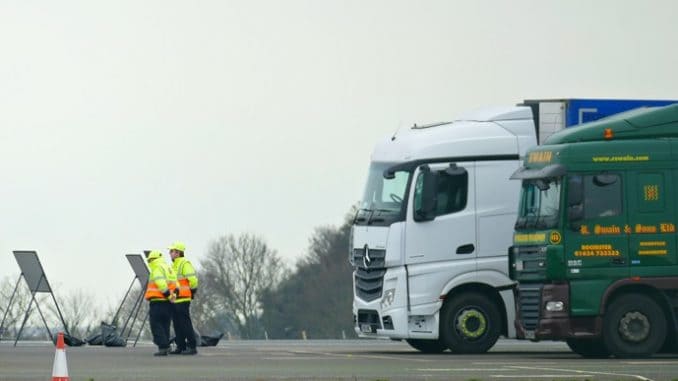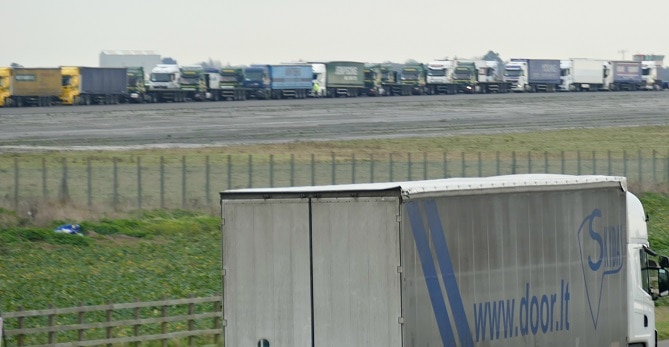
Negotiations are taking place to extend the deal for the Manston airport site to continue to be designated as a ‘EU exit’ lorry park until the end of June 2021.
A special development order allows use of the site to hold up to 6,000 HGVs to help cope with possible post EU exit jams at the Port of Dover. It currently runs until December 31 of this year.
The order ‘augmented’ the deal to use Manston as a short-term solution for Operation Stack which was first struck with then-site owners Stone Hill Park in August 2015 following a Summer of disruption due to French strikes and growing migrant camps in Calais.
The aim was to park lorries up at the site and so reduce pressure on the M20. The government extended the deal in November 2017 to run until the end of 2019.
The deal was then extended again until December 31, 2020 with additions to allow work on the site to create a new access, add temporary hardstanding and modifications to the new entrance and create lining and signage.

This was part of the planning for a ‘no deal’ withdrawal last year that saw the enactment of Operation Brock (under Operation Fennell) – the updated version of lorry queuing system Operation Stack- which contained 5 phases for dealing with a backlog of HGVs. Phase 1 uses the A20 and Dover and Eurotunnel buffer zones, phase 2 is a contraflow system on the M20, phase 3 uses the A256 and sends up to 6,000 lorries to be parked up on the Manston airport site.
Phase 4 uses the M26 and phase 5 takes traffic out of the county.
However, Operation Brock was only intended to function for a few months resulting in a sunset clause for the orders to cease to have effect on December 31, 2020.
With the withdrawal agreement, which took effect from January 31 this year, and the end of the transition period for exit from the EU’s single market and customs union, new border arrangements need to be in place from January 1, 2021.

These include extending the use of the Manston site.
Although SHP sold the airport site to Riveroak Strategic Partners in July 2019 the firm retains its contract, and payments, with the Department for Transport for use of the Manston site as a ‘Brexit’ lorry park and is responsible for providing equipment if the site is used for the parking up of HGVs.
The negotiations are currently taking place between RSP, SHP and the Department for Transport. SHP will continue to manage the operation if it goes live.
The deal will, however, mean the archaeological and preliminary works to create a freight cargo hub at the site will be delayed by some five months.
A Parliamentary question lodged by Broadstairs-born Lord Pendry asked how much has so far been spent on preparations for the Manston lorry park.
In answer Baroness Vere of Norbiton said: “I can confirm that between August 2015 and June 2020, the Department of Transport has paid a total of £19.4million for the use of Manston airfield as a lorry park.
“DfT paid £10.3m as part of the EU Exit no deal preparation contingency planning and £9.1m for the use of Manston airfield for business as usual and Operation Stack.”
EU Exit sites for Kent
Several other Kent sites are earmarked for post-single market use including Ebbsfleet International station which is expected to hold up to 80 lorries at a time and have a booking system implemented for slots.
Other customs sites will include a £45million lorry park on a 27-acre site off Junction 10a of the M20 in Sevington to hold up to 2,000 trucks and a field next to the White Cliffs Business Park in Dover for 1,200 trucks.
The Dover-Calais crossing is used by about 10,000 lorries a day. The Guardian has reported that confidential government documents warn of predicted queues of 7,000 lorries and two-day delays to cross into the EU.
The “reasonable worst-case scenario” report was drawn up by the Border and Protocol Delivery Group.
‘New control requirements’
A UK Government Spokesperson said: “We are taking back control of our borders and leaving the single market and the customs union at the end of this year, bringing both changes and significant opportunities for which we all need to prepare.
“In July 2020, the government committed to spending £470m on new border infrastructure to support ports in building extra capacity to meet the new control requirements where there is space to do so, and, if necessary, to build additional inland sites across the country where checks can take place.
“Engagement is underway with ports and we are speaking to Local Authorities about potential inland sites. Final decisions on inland sites will not be made until we have established the extent of new infrastructure that will be delivered at ports.”
A consultation document published by the government adds: “At the end of the transition period, the UK will be treated as a third country with respect to EU rules, which creates new potential sources of disruption for the Short Straits.
“The French authorities will impose full EU customs and controlled goods checks on all goods travelling from GB to the EU’s customs territory at Hauts-de-France (for HCVs coming by ferry from the Port of Dover or those HCVs using Eurotunnel’s freight service). The French authorities have increased the capacity of their facilities, but these checks could nevertheless slow down cross-border movement, which could have a knock-on effect on road traffic in Kent.”
UPDATE: The proposal has now (October) been agreed with RSP. The Department of Transport will now be carrying out studies on how traffic and the environment will be affected and will be inviting local feedback.

